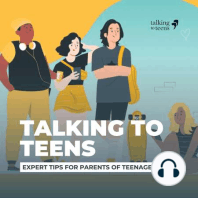24 min listen

Ep 49: Risky Behaviors and Self Harm
Ep 49: Risky Behaviors and Self Harm
ratings:
Length:
25 minutes
Released:
Sep 9, 2019
Format:
Podcast episode
Description
Click for full show notes, exercises, and parenting scripts from this episodeSelf harm is not just about cutting yourself. And it isn't something that's only an issue with girls. A teenage boy who punches the wall in anger so hard that his hand starts to bleed is also taking part in self harm. So is the college student who drinks enough alcohol to make herself sick, or the kid who purposely picks a fight with someone twice his size.As odd as behaviors like this might appear, they actually make perfect sense from a teenager's perspective. This week on the podcast I spoke with Michelle Mitchell, the author of the new book, Self Harm: Why Teens Do It And What Parents can do to Help.Michelle told me self harm happens when teenagers have strong negative emotions they don't know how to deal with. By making themselves sick or hurting themselves teenagers can find a sense of escape. The physical pain has a numbing effect and that temporary release can be highly addicting.And the numbers are pretty scary. By some estimates, over 20% of teenagers experiment with self harm at some point and another 14% consider it but ultimately decide not to try it. It's hard to pin down exact statistics because many teens and their families never report the behavior to their doctor.What Can Parents Do?The first thing to think about is how you can equip your teenager to cope with very strong negative emotions in ways that are healthy and productive. Michelle told me what you can say to your teen to get them to reflect on their emotions and try out different strategies for dealing with them.Of course, the best scenario is if you can have this talk before your teenager even thinks about self harm. However, this obviously isn't always an option. What should you do if you think your teen might already be self harming?Your first reaction is VERY important. Many parents react with worry and fear and rush into "fix-it" mode. But this just piles more negative emotions on your teen and often makes a tough situation even worse.On this episode, Michelle breaks down exactly what parents can say in the initial conversation, as well as the follow-ups. The key is to reduce your teenager's feelings of vulnerability so they feel comfortable talking about it. Then, you want to help them discover a replacement behavior they can use instead of harming themselves next time they experience negative emotions. Finally, you can talk about more long-term coping mechanisms and encourage your teen to work on it further with a therapist.
Released:
Sep 9, 2019
Format:
Podcast episode
Titles in the series (100)
Ep 6: Don't Raise a Wimpy Teen: Nick Boothman, New York Times bestselling author of "How to Make People Like You in 90 Seconds or Less" reveals how to instill perseverance in a teenager. He has raised five highly successful children and he worked hard to teach his kids to be resourceful by Talking To Teens: Expert Tips for Parenting Teenagers